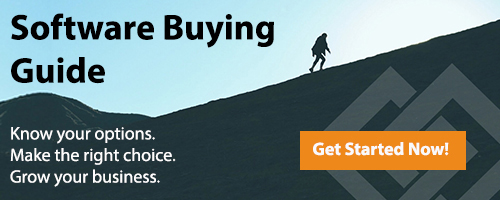With 2019 just around the corner, have you started planning for the year ahead? If software is on your radar, it’s important that you have a plan in place BEFORE you start searching for a new solution. In the world of back-end business management software, there is sometimes a disconnect between the types of systems available on the market and how they can help run your business. This is further complicated by the fact that may software vendors use the same terminology in different ways. Let’s start by distinguishing between two common types of software solutions – introductory systems (which includes standalone accounting and inventory systems) and ERP (enterprise resource planning software). Introductory software solutions such as QuickBooks, are designed to manage one aspect of a company’s operations such as accounting. Even if these types of systems provide additional features for inventory or contact management, it’s primary functionality is around one business process and often requires integration with additional systems to include advanced functionality for inventory, contact management, warehouse management and barcode scanning. Introductory systems are great for companies with a low number of transactions, inventory items and users, and for basic management of operations. These types of solutions have a lower price tag and are quick to implement. However, as the name implies, introductory solutions are just that – a starting system for when your business is new and small. As your business grows and you expand into new markets, there may come a time where ERP is a more appropriate solution. This can happen for a variety of reasons including a restriction on the amount of data or number of users your existing system can manage, the need for additional functionality such as lot tracking, landed cost tracking or barcode scanning, or the need for a unified solution to manage all business operations (as opposed to manually entering information into multiple, standalone systems). Whatever the reason, if you decide to make the transition to a sophisticated ERP solution, you need to prepare the appropriate resources, as the search for ERP and implementation process will be the biggest decision your business makes in 2019 and should be treated as such.
It's true that researching different ERP solutions, speaking with vendors, watching demonstrations, implementing the software and training employees is a big project – but that is not the only reason why the transition to ERP software should be treated as such. Rather, ERP software is designed to manage all aspects of your company’s operations – including sales, inventory management, invoicing, purchasing, warehouse management, POS, eCommerce, customer service – and therefore, as the backbone to running your business, has huge implications on the success and growth of your company. Moving to ERP software provides your company with various opportunities to automate processes, eliminate errors and tedious manual work, reduce double entry, scale to reach new markets and customers, improve your warehouse operations and much more. This is why proper thought and consideration needs to go into the search and implementation process – the ERP project as a whole. As with any capital investment such as purchasing additional warehouse or retail space, launching an eCommerce store or buying new equipment and machinery, a successful ERP project requires significant planning, research and dedication of resources. Whoever is responsible for finding a new solution and making the purchase, needs to feel confident that their decision will be well received by all employees and that it will provide positive ROI and help the company achieve its goals. Proper planning for such a solution helps to mitigate this fear of failure and find the right solution. In addition, you want to work with a vendor who will give you peace of mind that you will always have access to the latest and greatest in technology and process improvements through an ERP solution that is under constant development and provides regular upgrades.
Download our Software Buying Guide to help your business find the right ERP system.











